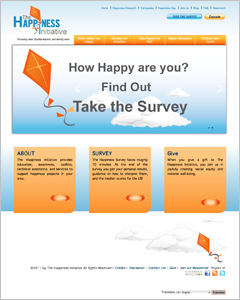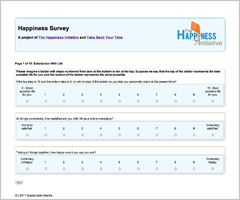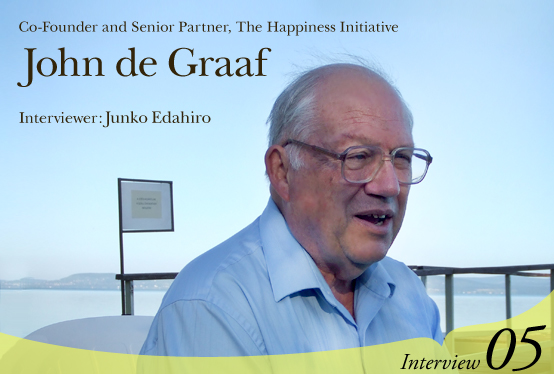- Junko :
- How do you see the time use or time issue or happiness and related issues in the United States? Have you seen any changes for better or worse?
- John :
- There are different ways to think about that. Clearly, well being in the United States is declining.
- The United States, in my opinion, is headed in a very bad direction for quality of life, because we've become obsessed with the idea that no one should pay any taxes, that the answer to every problem is to reduce taxes because that will spur economic growth, and of course it doesn't work. It makes all the problems worse. It destroys the public infrastructure, the schools, and the public transportation. All of these things are in great decline in the United States.
- I now see what I never saw before, while I walk about 20 minutes to and from work each day at the television station. I now see people sleeping in all the alleys. I see beggars on all the corners. The United States is becoming a third-world country. That's really what is happening and it's tragic.
- There's only one positive side to that. Because no one can have anything anymore, and because 80 percent of the population is actually losing income compared to what they had, they have to in some way start to get a little bit used to living on less, and with the recession they actually work somewhat less.
- So we find a strange phenomenon in the United States, which is that with the recession, while it's very painful for many, many people, we've actually seen health improve.
- Junko :
- Interesting.
- John :
- Because people are working less. We don't have the kind of mandatory overtime that we had before. Fewer factories are operating, so there's less air pollution. People are driving less, and so there are fewer accidents, less air pollution.
- You have more people having a little more time, so they're exercising. More people are connecting socially, because they need to be supported.
- So there is a kind of silver lining to this dark cloud, but it can only go on so long in a way. It's good at first, but if it goes on too long the psychological effect of a lot of this unemployment and of all of these things is too great, and we think those health numbers will begin to go down again.
- And the polarization in society, the anger, the stress -- these will more than make up for the benefits in time and will cause health to decline.
- Junko :
- Right.
- Junko :
- This will be my last question. You were working on the Sustainable Seattle project, the Happiness Initiative. Would you like to talk about your future project, how to tackle this happiness or well being issue?
- John :
- Well, what we called the Seattle Area Happiness Initiative -- now simply the Happiness Initiative because we have now interest from all over the United States and even from some other countries -- has been going on for a little more than a year a half, but in a big way for one year.
- We will have a new, shorter survey. We had a 30-minute survey derived by Canadians from the Bhutan survey, used first in Victoria, British Columbia. That shorter survey has been online. Over 7,000 people have taken it. We've gotten a lot of good data.


Online survey about happiness and well-being. The survey takes about ten minutes and consists of 18 pages of questions about health, feelings, time use, and more.
-
We had a lot of comments that it was too long because the lowest scores are in time balance. We understood that we have to put that survey through a big process of development and scientific validity, to get it down to ten minutes or so, but with the same validity as the previous survey.
We now have a new website with toolkits for people, information on how to use the survey, how to hold town meetings to discuss the results, how to make a report card for your city using the survey results.
The survey measures ten dimensions of life, based on nine Bhutan dimensions and one from Gallup, which is working experience.
- Our city council in Seattle unanimously supports this project. They've agreed to use these results to help determine their city policy.
- So we are now seeing with all of this that this idea can spread to many other cities. It can be used in businesses, and there is especially lots of excitement in universities. We now have about 25 communities that want to use the survey and the whole process to go through a happiness initiative. We have about 100 universities and colleges that want to do that. We have some businesses interested. So I think it's very exciting.
- We're not there yet. We have a lot of learning to do in many ways. The cities that are starting to do this are tests for us. They're going to help us make this the best way possible.
- But I'm confident. The enthusiasm of people for this, the way people say, "Just taking this survey is changing my life." We hear that from people. "It made me think about all these things in life that I don't usually think about. It asks me questions." I think it's quite remarkable.
- And the media likes this. This is an immediate thing that is simple enough for the media to understand. We are asking questions and we are creating a picture of society that is more full and more real than this thing called GDP. That's a simple message, really, and the media understands that. I have had requests for interviews from the Wall Street Journal, and many other media.
- Junko :
- How exciting. Thank you very much for your time.
- John :
- Thank you.
John de Graaf
Co-Founder and Senior Partner, The Happiness Initiative

Independent producer of television documentaries, Executive Director of Take Back Your Time, an organization challenging time poverty and overwork in the U.S. and Canada and the co-founder and senior partner of The Happiness Initiative.
John has been an independent producer of television documentaries, many with environmental subjects, for 35 years. He is also the recipient of more than 100 regional, national and international awards for film-making. He is a frequent speaker on issues of overwork and over-consumption in America. John is the co-author of the best-selling book, Affluenza: The All-Consuming Epidemic (Berrett-Koehler, 2001/2005--now published in eight other languages as well.).His newest book, What's the Economy Good For, Anyway? Why It's Time to Stop Chasing Growth and Start Pursuing Happiness, co-authored with David K. Batker, was published by Bloomsbury in 2011.
- Take Back Your Time
- http://www.timeday.org/
- Happiness Initiative
- http://www.happycounts.org/







